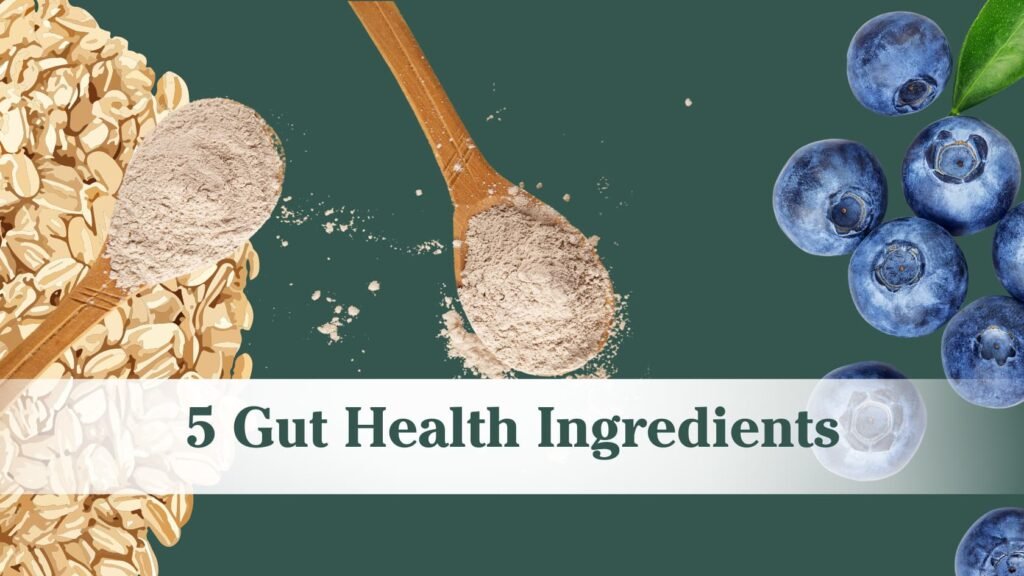Smoothies can be a powerhouse for gut health, but to create a truly effective gut health smoothie, it’s important to understand which ingredients specifically support digestive wellness.
What Makes it Gut Healthy?
To maximize the gut health benefits of a smoothie, we’ll focus on including more fiber-rich and fermented foods, while limiting ingredients high in saturated fats and added sugars. These choices not only support a healthy gut microbiome but also contribute to overall health and well-being.
Fiber helps feed the beneficial bacteria in the gut, while probiotics are the beneficial bacteria that directly support a healthy gut microbiome.
There are many smoothie ingredients that naturally contain both fiber and probiotics. As a registered dietitian, I’ve curated a list of my top choices that not only support gut health but also deliver a variety of essential nutrients to boost overall wellness.

1. Berries
As a dietitian, I love incorporating berries into gut health smoothies. They’re rich in antioxidants and packed with fiber, making them an excellent choice for supporting digestive health. Compared to many other fruits, berries are also lower in calories and natural sugars, which can be beneficial for individuals managing their carbohydrate intake.
All berries offer slightly different nutrient profiles, but they share one important benefit: they’re high in fiber. My favorite way to include them in gut health smoothies is by using a frozen mixed berry blend to maximize variety and nutrient content. Just one cup of mixed berries provides about 4-6 grams of fiber, which is 16-24% of the recommended daily value for fiber intake [1]. Choosing frozen berries also ensures consistent taste, preserves peak nutrient levels, and saves money when fresh berries are out of season.
When making your smoothie, you can certainly use a variety of fruits, but including at least some berries ensures you’re getting the added benefit of their naturally high fiber content, an essential component of any gut health smoothie.
2. Seeds
When it comes to seeds, think flax, chia, pumpkin, sunflower, and sesame. These nutrient-dense additions are excellent sources of both unsaturated fats and dietary fiber, two key components for supporting gut health. Flaxseeds and chia seeds, in particular, are rich in alpha-linolenic acid (ALA), a plant-based omega-3 fatty acid that supports overall health. Meanwhile, pumpkin, sunflower, and sesame seeds each offer their own unique benefits, making them great additions to any gut health smoothie.
For smoothies, I find it easiest to add ground flaxseeds if you prefer a smooth texture without any grit. That said, sunflower seed butter or tahini (sesame seed paste) are also excellent, creamy alternatives that blend well and contribute to the gut health benefits of your smoothie.
3. Fermented foods
Fermented foods like yogurt, kefir, or plant-based yogurts are excellent additions to gut health smoothies. They not only provide beneficial probiotics but can also boost the protein content, supporting both digestive and overall health.
When choosing fermented dairy products like yogurt or kefir, it’s important to remember that full-fat versions can contain significant amounts of saturated fats and added sugars. To keep your gut health smoothie both nutritious and balanced, always check the nutrition label and opt for lower-fat, low-sugar options whenever possible.
Dairy-free yogurts are also a good source of probiotics, making them a great option for gut health smoothies. However, many dairy-free varieties are coconut-based, which can be high in saturated fat, similar to full-fat dairy, and often low in protein. To help you navigate the dairy-free options, I’ve compiled a list of my top three choices that are high in protein, lower in sugar, and lower in saturated fat. You’ll find the list attached below.
4. Oats
The same oats you use to make oatmeal can also be added to your gut health smoothie to incorporate whole grains into your diet. Whole grains provide important nutrients like B vitamins, iron, vitamin E, and fiber, all essential for supporting a healthy gut or overall wellness.
When adding oats to your gut health smoothie, rolled oats or quick oats are the best choices for blending smoothly into the mix.
5. Plant-based Protein Powder
Plant-based protein not only provides essential protein but also offers gut-friendly benefits that many milk-based proteins lack. While plant-based proteins used to get a bad rap for texture and taste, they have significantly improved, making them a great addition to any gut health smoothie.
The gut health benefits of plant-based proteins come from their protein sources, which often include soy, peas, brown rice, and more. These ingredients are naturally high in fiber or contain some fiber, and although many components are removed during protein concentration, fiber is often retained. This leftover fiber helps support digestive health, making plant-based protein powders a valuable addition to your gut health smoothie.
Take Away
In a gut health smoothie, ingredients like berries, seeds, oats, and plant-based protein powders support digestive wellness primarily through their fiber content. Meanwhile, fermented dairy products such as yogurt and kefir, along with plant-based yogurts, contribute beneficial probiotics. You don’t need to include all these components in every smoothie, a mix-and-match approach allows you to enjoy a variety of flavors and nutrients with each delicious sip, all while promoting a healthy gut.
Check out the guide below on how to make a balanced smoothie.
